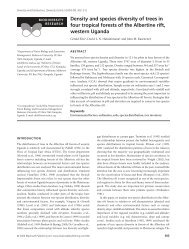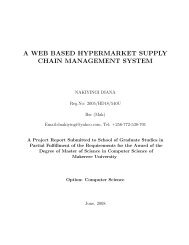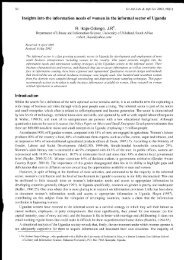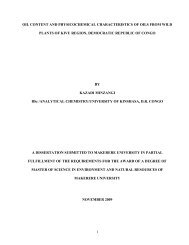THE UNIVERSITY OF LEIPZIG
THE UNIVERSITY OF LEIPZIG
THE UNIVERSITY OF LEIPZIG
You also want an ePaper? Increase the reach of your titles
YUMPU automatically turns print PDFs into web optimized ePapers that Google loves.
The social movement’s notion articulates a rare view relating to biodiversity in form of bio-<br />
democracy. They begin by enumerating the threats to bio-democracy and putting emphasis on<br />
habitat destruction. They argue that habitat destruction is a product of grandiose development<br />
projects, monocultures of minds, and agriculture promoted by the capitalistic and reductionist<br />
science of the North. These bio–democracy advocates shift attention from South to North as<br />
the source of the contemporary biodiversity crisis. 97 At the same time, they suggest a radical<br />
re-definition of production away from the logic of uniformity towards the logic of diversity.<br />
Their proposal for bio-diplomacy and bio-democracy is articulated based on a series of<br />
requirements regarding local control of natural resources. 98 They are in support of practices<br />
relying on the logic of diversity, including recognition of the cultural basis of biological<br />
diversity. In addition, these critics of western capitalism are opposed to bio-technology as a<br />
main tool of maintaining biodiversity, but call for the adoption of intellectual property rights<br />
as the mechanism for the protection of local knowledge and resources. 99 They further<br />
advocate for all forms of collective rights and shared character of knowledge and resources.<br />
These movements explicitly construct a political strategy for the defence of territory, culture<br />
and identity. While having many points in common with the African notion, this perspective<br />
is conceptually distinct, and politically occupies a different role in the biodiversity enterprise.<br />
Aware that biodiversity is a hegemonic construct; the activists acknowledge that, this<br />
discourse opens up a space for defence of their project in the realm of biotic resources. On<br />
many accounts, concerns regarding biodiversity have followed from broader struggles for<br />
territorial control. This view contests the most cherished views and constructs of modernity<br />
such as positivist science, the market, and individual property. 100<br />
Social movementists, however, don’t develop their premises in isolation, but in consonant<br />
with two important factors. One is the dominant vision of biodiversity conservation, while the<br />
other is in defence of local cultures, ecologies and territories. The social movements’ political<br />
strategy which began to emerge in the 1990s, has increasingly taken a leading position at both<br />
the national and international arenas. This notion’s movers have created a political ecology<br />
framework through their interactions with the community, state, NGOs and academic sectors.<br />
Within this framework, the territory is seen to be the most fundamental and most multidimensional<br />
space for the creation of ecological, economic and cultural practices of the<br />
community. 101<br />
The territory is perceived in terms of patterns of settlement, use of spaces, and use of<br />
resources. These systems are geared mostly to local consumption than the market, capital or<br />
wealth accumulation. It is for this reason that traditional practices have been sustained for this<br />
long. Among the practices to highlight are; low intensity exploitation, shifting use of<br />
97 Escobar, A. 1999. Gender, Place and Networks. A political Economy of Cyber culture. In Creating New<br />
Cultures in Cyberspace, edited by W.Harcourt, 31-54. London: Zed Books.<br />
98 Ibid.<br />
99 Restrepo, E and D. Del Valle. 1996. Renacientes del Guandal.Bogota: Universidad Nacional.<br />
100 Escobar, A. 1996. Cultural Politics and Biological Diversity: State, Capital and Social Movements in the<br />
Pacific Coast of Colombia. New Brunswick: Rutgers University Press.<br />
101 Brush, E et al. 1998. Valuing Local Knowledge. Washington: Washington Island Press.<br />
23






